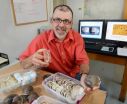(Press-News.org) An experimental treatment for blindness, developed from a patient's skin cells, improved the vision of blind mice in a study conducted by Columbia ophthalmologists and stem cell researchers.
The findings suggest that induced pluripotent stem (iPS) cells – which are derived from adult human skin cells but have embryonic properties – could soon be used to restore vision in people with macular degeneration and other diseases that affect the eye's retina.
"With eye diseases, I think we're getting close to a scenario where a patient's own skin cells are used to replace retina cells destroyed by disease or degeneration," says the study's principal investigator, Stephen Tsang, MD, PhD, associate professor of ophthalmology and pathology & cell biology. "It's often said that iPS transplantation will be important in the practice of medicine in some distant future, but our paper suggests the future is almost here."
The advent of human iPS cells in 2007 was greeted with excitement from scientists who hailed the development as a way to avoid the ethical complications of embryonic stem cells and create patient-specific stem cells. Like embryonic stem cells, iPS cells can develop into any type of cell. Thousands of different iPS cell lines from patients and healthy donors have been created in the last few years, but they are almost always used in research or drug screening.
No iPS cells have been transplanted into people, but many ophthalmologists say the eye is the ideal testing ground for iPS therapies.
"The eye is a transparent and accessible part of the central nervous system, and that's a big advantage. We can put cells into the eye and monitor them every day with routine non-invasive clinical exams," Tsang says. "And in the event of serious complications, removing the eye is not a life-threatening event."
In Tsang's new preclinical iPS study, human iPS cells – derived from the skin cells of a 53-year-old donor — were first transformed with a cocktail of growth factors into cells in the retina that lie underneath the eye's light-sensing cells.
The primary job of the retina cells is to nourish the light-sensing cells and protect the fragile cells from excess light, heat, and cellular debris. If the retina cells die – which happens in macular degeneration and retinitis pigmentosa – the photoreceptor cells degenerate and the patient loses vision. Macular degeneration is a leading cause of vision loss in the elderly, and it is estimated that 30 percent of people will have some form of macular degeneration by age 75. Macular degeneration currently affects 7 million Americans and its incidence is expected to double by 2020.
In their study, the researchers injected the iPS-derived retina cells into the right eyes of 34 mice that had a genetic mutation that caused their retina cells to degenerate.
In many animals, the human cells assimilated into mouse retina without disruption and functioned as normal retina cells well into the animals' old age. Control mice that got injections of saline or inactive cells showed no improvement in retina tests.
"Our findings provide the first evidence of life-long neuronal recovery in a preclinical model of retinal degeneration, using stem cell transplant, with vision improvement persisting through the lifespan," Tsang says. "And importantly, we saw no tumors in any of the mice, which should allay one of the biggest fears people have about stem cell transplants: that they will generate tumors."
Tsang hopes to begin a clinical trial for macular degeneration patients in the next three years, after more preclinical testing in animal models.
Already a similar trial – testing retina cells derived from embryonic stem cells – has seen encouraging preliminary results. A paper from this study, published earlier this year, reported that the stem cells are safe and have potential to improve the vision of two patients with macular degeneration.
"These results are encouraging, but iPS cells could be a more attractive option than embryonic stem cells," Tsang says, "because patients may not need drugs to prevent rejection of the transplanted cells."
Regardless of which cell works better, the prospect of stem cell transplants may mean many people with macular degeneration may never lose their vision.
"We have a good idea which patients will eventually lose their vision. In the early stages of macular degeneration we can tell by looking in the eye, and new genetic tests can now predict vision loss with 70 percent accuracy even before those signs emerge," Tsang says. "If the therapy is safe, we could intervene very early to prevent much vision loss."
###
The study was published online in advance of print in the journal Molecular Medicine. The research was supported by NIH grants 5P30CA013696, P30EY019007, and R01EY018213; the Schneeweiss Stem Cell Fund, and the Foundation Fighting Blindness.
Stem cells improve visual function in blind mice
2012-10-02
ELSE PRESS RELEASES FROM THIS DATE:
Fluoxetine increases aggressive behavior, affects brain development among adolescent hamsters
2012-10-02
BOSTON, Mass.-- Fluoxetine was the first drug approved by the FDA for major depressive disorder (MDD) in children and adolescents, and to this date, it remains one of only two selective serotonin reuptake inhibitors (SSRIs) registered for treatment of MDD in children and adolescents, despite reports that indicate this class of drugs is associated with side effects, such as agitation, hostility and aggression.
SSRIs have been amongst the most widely prescribed medications in psychiatry for over a decade. While there is a wealth of information regarding their effectiveness ...
Smartphone technology acceptable for telemedicine
2012-10-02
PHOENIX -- A new Mayo Clinic study confirms the use of smartphones medical images to evaluate stroke patients in remote locations through telemedicine. The study, the first to test the effectiveness of smartphone teleradiology applications in a real-world telestroke network, was recently published in Stroke, a journal of the American Heart Association.
"Essentially what this means is that telemedicine can fit in our pockets," says Bart Demaerschalk, M.D., professor of Neurology, and medical director of Mayo Clinic Telestroke. "For patients this means access to expertise ...
Omega-3 supplements may slow a biological effect of aging
2012-10-02
COLUMBUS, Ohio – Taking enough omega-3 fatty acid supplements to change the balance of oils in the diet could slow a key biological process linked to aging, new research suggests.
The study showed that most overweight but healthy middle-aged and older adults who took omega-3 supplements for four months altered a ratio of their fatty acid consumption in a way that helped preserve tiny segments of DNA in their white blood cells.
These segments, called telomeres, are known to shorten over time in many types of cells as a consequence of aging. In the study, lengthening ...
US firms bringing work home from overseas
2012-10-02
EAST LANSING, Mich. — Increasingly, U.S. firms are moving or considering moving their manufacturing operations back to domestic soil from overseas, finds a new study co-authored by a Michigan State University supply chain expert.
Fueling the trend are rising labor costs in emerging countries, high oil prices and increasing transportation costs, global risks such as political instability and other factors, said Tobias Schoenherr.
"Going overseas is not the panacea that it was thought of just a decade or so ago," said Schoenherr, assistant professor in MSU's top-ranked ...
Iowa State researchers study clam shells for clues to the Atlantic's climate history
2012-10-02
AMES, Iowa – Two Iowa State University graduate students are just back from the Gulf of Maine with another big catch of clam shells.
Shelly Griffin and Madelyn Mette recently boarded a lobster boat, dropped a scallop dredge into 30 meters of ocean water and pulled up load after load of Arctica islandica.
"These are the clams that end up in clam chowder," said Alan Wanamaker, an assistant professor of geological and atmospheric sciences in the College of Liberal Arts and Sciences. Wanamaker studies paleoclimatology, the variations and trends of past climates and environments, ...
Researchers harness the immune system to improve stem cell transplant outcomes
2012-10-02
VIDEO:
Dr. Amir Toor from Virginia Commonwealth University Massey Cancer Center's Bone Marrow Transplant program explains a recent clinical trial evaluating a new therapy for multiple myeloma that harnesses the power...
Click here for more information.
Richmond, Va. – (October 1, 2012) – A novel therapy in the early stages of development at Virginia Commonwealth University Massey Cancer Center shows promise in providing lasting protection against the progression of multiple ...
GI societies issue new colonoscopy surveillance guidelines
2012-10-02
Bethesda, MD (Oct. 1, 2012) — Patients at average risk of colorectal cancer who have a clean colonoscopy do not need to repeat the test for 10 years. This and many other practical recommendations for cancer prevention were issued in "Guidelines for Colonoscopy Surveillance After Screening and Polypectomy,"1 a consensus update issued by the U.S. Multisociety Task Force on Colorectal Cancer.
Colorectal cancer is preventable when precancerous polyps (growths) are found and removed before they turn into cancer. Screening for average risk patients is recommended to begin ...
New technologies advance livestock genomics for agricultural and biomedical uses
2012-10-02
MINNEAPOLIS / ST. PAUL (10/01/2012) —New genome editing technologies developed at the University of Minnesota for use on livestock will allow scientists to learn more about human diseases.
The genomic technique, known as TALENS, is described in a report published today in the scientific journal Proceedings of the National Academy of Sciences. The technique is cheaper and faster than previous technologies that allow scientists to genetically modify livestock animals; the animals are used to learn more about human diseases, which in turn can help researchers develop cures. ...
The obese brain may thwart weight loss
2012-10-02
"Betcha can't eat just one!" For obese people trying to lose weight, the Lays potato chip advertising slogan hits a bit too close to home as it describes the daily battle to resist high calorie foods.
But new research by Terry Davidson, director of American University's Center for Behavioral Neuroscience, indicates that diets that lead to obesity—diets high in saturated fat and refined sugar—may cause changes to the brains of obese people that in turn may fuel overconsumption of those same foods and make weight loss more challenging.
"It is a vicious cycle that may ...
NASA sees Nadine weaken to a tropical storm again
2012-10-02
NASA satellites continue to watch the long-lived Nadine in the eastern Atlantic. Today, Oct. 1, NASA satellite data revealed that Nadine has weakened from a hurricane and is now a tropical storm.
Over the weekend of Sept. 29 and 30, Hurricane Nadine dramatically rebounded. On September 19, 2012 Nadine appeared to be dissipating quickly and was expected to become post-tropical but after over a week of meandering near the Azores, Nadine sprang to life again as a hurricane on Friday September 28, 2012.
NASA's Tropical Rainfall Measuring Mission (TRMM) satellite's path ...


